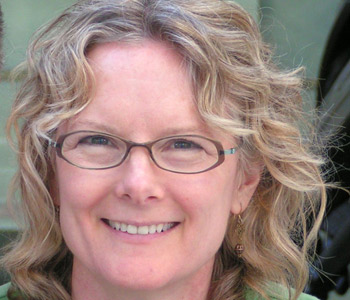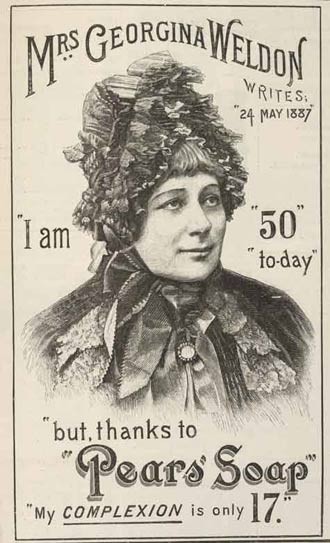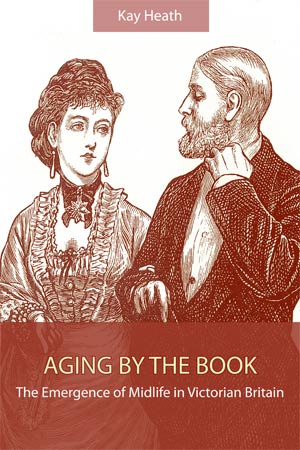
In an 1852 Punch cartoon, a middle-aged man looks in a mirror and says, “Good gracious! Is it possible?—No! Yes! No!—Yes! Yes, by Jupiter, it’s a grey hair in my favourite whisker!” Jokes like this might be routine to us, but in Victorian England they represented a new way of thinking about age.
Middle age had been considered the prime of life since Aristotle, an idea evident in “steps of life” drawings that were popular from the medieval era into the nineteenth century. They feature a fifty-year-old man—or less commonly a woman—who stands proudly on the top of an arched set of steps depicting the decades of life from ten to ninety. In the eighteenth century, concern about aging remained on the elderly. Longevity texts, describing elaborate techniques and rituals for living into a “green” or healthy old age, became the rage.
Though scholars usually discuss midlife anxiety as a product of the twentieth century, I argue that age anxiety was expanded in Victorian Britain to include the middle of the life course. The word “midlife” itself first appeared in an English dictionary in 1895 to designate this developing idea. In Aging By The Book, I demonstrate that concern about midlife became common during the Victorian era, that we inherited our obsession with being “over the hill” from the nineteenth century.
“The 1871 census defines middle age as thirty to fifty for both sexes, but novels demonstrate a clear gender difference: fictional women begin middle age at thirty while men remain ‘young’ a decade longer.”
I became interested in writing about age as a “non-traditional” graduate student in my early forties. Not just self-conscious about being older than my classmates, I also couldn’t help but notice that sometimes I was older even than the professor. As we discussed race, class, and gender as key aspects of identity, I began thinking about age. My fellow grad students were finding life partners and wondering whether to have babies, but I was parenting teenagers and dating after the end of a twenty-year marriage. My life stage seemed just as important as my middle-class, white femaleness. I became fascinated with the ways midlife was portrayed—and overlooked—in the texts we were reading. I began researching this topic and found midlife anxiety in a wide variety of nineteenth-century publications: conduct books, medical texts, and advertisements, but especially in novels.
When did midlife occur for Victorians, and why were they so anxious about it? Though average life expectancy in 1801 was thirty-six and by 1901 had increased only about fifteen years, adults knew they might live into their eighties and beyond. The 1871 census defines middle age as thirty to fifty for both sexes, but novels demonstrate a clear gender difference: fictional women begin middle age at thirty while men remain “young” a decade longer.
Midlife anxiety developed due to a number of changes in a more industrial, commercial, and scientific Britain. Darwin’s theories created a sense that life is brief and time is short. Many people moved to the city from farms, their lives no longer determined by cycles of daylight and seasons but scheduled around clocks and railway timetables. Physicians began to specialize in the elderly and diagnosed aging in terms of disease. Degeneration theory, a belief that modern life was causing evolution to turn backward, became popular at the end of the century. Eminent authority Max Nordau warned that “the vertigo and whirl of our frenzied life” lead to accelerated and earlier aging.
Changing ideas about gender also increased age anxiety. Early in the century, masculinity was understood in terms of gentlemanliness. Manly men in Jane Austen’s fiction, for example, are gentlemen. As middle- and working-class men got the vote, however, labor gained new respect. Professions and trades became an important aspect of identity, and manliness was earned, rather than inherited and cultivated. The rise of organized sports put new emphasis on youthful muscularity, and Britain’s growing empire required tough adventurers. Pension plans were invented, suggesting that men could age out of the ability to work, and the new science of sexology studied how virility wanes with age. As the masculine ideal transformed from upper-class gentleman to hard-working, physically fit man of business and builder of empire, aging men were hard-pressed to compete.
Victorian novels are filled with male age anxiety. Dickens’s men in their forties and fifties often worry about whether their “time of love has gone by.” In Trollope’s The Way We Live Now, midlife gentleman Roger Carbury struggles in a corrupt industrialized nation and loses the girl to a younger man. Both George Eliot’s Middlemarch and Trollope’s final novel, An Old Man’s Love, serve as cautionary tales about the inadequacies of fifty-year-old suitors. Wilde’s The Picture of Dorian Gray goes a step further, equating aging with evil, as Dorian’s sins appear on a painting in terms of grotesquely advanced age.
Older women had long been devalued in Britain, but Victorians added a new twist. With the rise of gynecology, female sexuality was considered delicate and pathological in comparison to the male norm. At menopause, women were devalued even more for losing fertility. Physician J. Braxton Hicks (now known for the uterine contractions named after him), argued that a post-menopausal woman enters “the neutral man-woman state,” and, “losing sexuality,” she becomes “useful.” Midlife women were urged to exchange sexuality for service as they helped the next generation find mates.
This expectation is evident in many Victorian novels. For example, Dickens portrays amorous forty-ish matrons like Mrs. Nickleby and Miss Sparsit, and the lovelorn fifty-year-old Miss Havisham as absolutely outside any possibility for romance. They are either comic or abusive for dwelling on their own amorous lives instead of helping arrange marriages for younger women. In contrast, Charlotte Brontë’s Mrs. Pryor is the ideal matron—reluctant to appear attractive and eager to assist her daughter’s romance. Widows who remarry can be exceptions to this rule, however, especially in Trollope’s novels that empower midlife women. In Can You Forgive Her?, the Widow Greenow is satirized for husband-hunting in her forties; by the end, however, she’s a beautiful, sexy woman who admires “a well-made man” and remarries for love.
Midlife anxiety thrived in other forms of Victorian print culture as well. One good example is soap advertisements. At mid-century, an array of mass produced products were put on display at the Crystal Palace exhibition, and Victorians learned the joys of consumerism. As advertising expanded and national brands began to appear, Francis Pears’s partner, Thomas Barratt, created innovative marketing strategies to sell soap. Advertising Pears for many uses—a gentle cleanser for children, a shaving soap for men—he focused on women as consumers interested in combating age.
Barratt uses a variety of strategies in his advertisements to promote soap as an anti-aging treatment. He incorporates testimony from a “most eminent authority of the skin, Professor Erasmus Wilson,” who promises that “a good soap is certainly calculated to preserve the Skin in health, to maintain its complexion and tone, and prevent its falling into wrinkles.”
Scholars have written about racism in his ads that depict black children washed white, but Barratt also conflates race with age. For example, in one ad, a dying Aboriginal man dreams of being reborn with young, white skin, the Pears logo floating on the horizon. In other campaigns, Barratt ran ads featuring youthful, notorious women. Lillie Langtry, an actress and mistress of several prominent men, including the Prince of Wales, appeared in ads promising to “preserve” the skin. The infamous Georgina Weldon, a singer and amateur lawyer who successfully sued her husband for trying to commit her to a madhouse, starred in an 1888 campaign. Looking up demurely from under her bonnet, Weldon claims, “I am 50 today, but thanks to Pears’ Soap my complexion is only 17.” Barratt even suggests that his product is powerful enough to win a woman wealth and peerage. A Pears poem presents Mary Ray, the milkman’s daughter, who wisely washes with this soap and ends up marrying a duke, her skin so youthful that at ninety she’s mistaken for “her own grand-daughter.”
Barratt’s success is evident in other soap manufacturers’ imitations of his style. Sunlight Soap followed his lead with headlines such as “How to keep young” and “Why does a woman look old sooner than a man?” Barratt showed manufacturers how to transform a regional product into a nationally branded and lucrative anti-aging beauty commodity, a strategy that both resulted from and strengthened Victorian apprehensions about midlife.

“Older women had long been devalued in Britain, but Victorians added a new twist. With the rise of gynecology, female sexuality was considered delicate and pathological in comparison to the male norm.”
I hope this book not only offers a fresh perspective on Victorian literature but suggests a new way of thinking about age both then and now. Of course, age is a biological fact, but our experiences of it are shaped by our beliefs. To a large degree, these are foisted upon us by culture, by socially-constructed “meanings” that media images and market strategies assign. I want my readers to see aging as a product of culture. Only when we question what we think is natural about aging do we become aware of how our perceptions are formed by societal cues. Only when we are armed with this kind of consciousness, can we overcome ageist stereotypes that cloud our vision and restrict our possibilities.


Kay Heath is an associate professor of English at Virginia State University. In addition to Aging By The Book, she has published on nineteenth-century aging in Victorian Literature and Culture and Frances Trollope and the Novel of Social Change. Currently, she is working on a project about Victorian women who began writing careers in midlife. Heath was a 2008 recipient of a Mellon Fellowship at the Harry Ransom Center. She received her Ph.D. from Rice University in 2001.